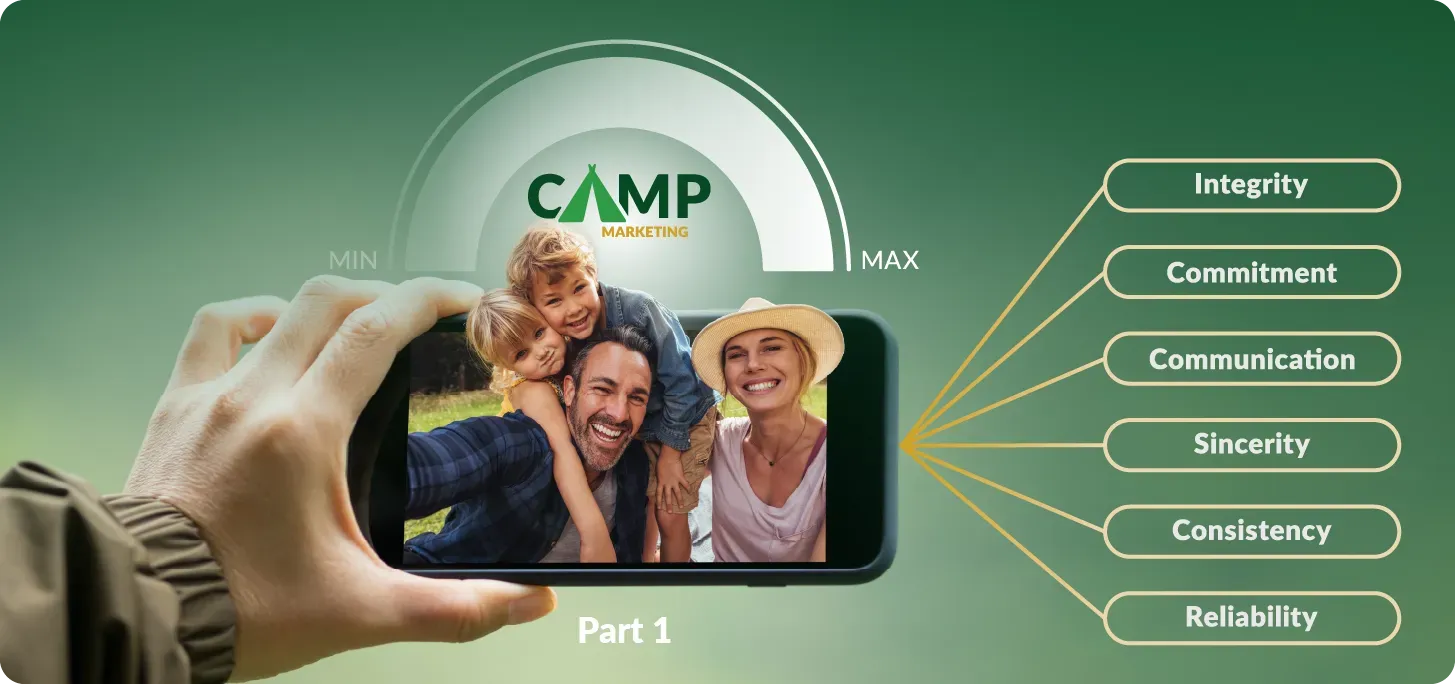Summer Camp Marketing: Turn Uncertainty into Excitement! [Part 1]
April 9, 2025
Marketing your summer camp is not just about filling spots. It’s a critical part of camp management! It's all about creating excitement, easing concerns, and setting the stage for growth and adventure. A strong marketing strategy doesn’t just boost enrollment; it builds trust, loyalty, and long-term success.
Welcome to the first article in our four-part series! This article contains tips and tricks to help you transform hesitant parents into enthusiastic camp families. We will look at some ideal marketing tools and tactics you can use. Later in the series, we will focus on making those families loyal camp supporters.
Are you ready to elevate your camp’s marketing strategy and boost registrations?
Understanding & Overcoming Parental Concerns About Camp
Before signing up, camp families want to feel 100% confident in your team and facilities.
Does your camp marketing address their biggest concerns?

Some of the most common questions and concerns parents and guardians have are about the following topics:
Address Camp Cost & Affordability
Is camp worth the cost? Summer camp isn’t cheap. It’s understandable that the cost of camp may be a hurdle for some parents and guardians. If your camp team hears frequent concerns about pricing, consider offering flexible payment plans.
We’ve gone over the pros, cons, and alternatives to keeping camp affordable with payment plans in a recent blog post.
If you already offer payment plans, the concern you're facing
might be more about value than financial cost. Beyond simple affordability and payment plans, emphasize the lifelong value and benefits of a camp experience. Children at camp build confidence, independence, and social skills. This content shows how camp is different from regular childcare options that people might consider instead.
Explain Camp Safety & Security Measures
Will my child be safe? Safety is a major concern. Camp parents may define safety in a lot of different ways. Concerns can range from medical care to bullying and even emergency preparedness.
Be proactive in addressing these concerns. Here are a few good places to start!
- Create easy-to-follow videos and guides on items such as camper health, security measures, and staff training.
- Emphasize camper-to-staff ratios and highlight any specialized dietary, medical, or mental health staff on-site.
- Ensure staff are prepared to explain and carry out your policies and procedures.
- Share safety policies and FAQs on your website, social media, and during registration.
For iCampPro customers, we built an FAQ tool directly into our registration portal to help!
Prepare for Homesickness & Separation Anxiety
Will my child feel comforted and supported? First-time campers—and their parents—may worry about homesickness and separation. Parents fear getting that dreaded phone call asking them to pick their child up early from camp because they can’t cope.
Helping parents prepare their kids
(and themselves) for that moment is key to overcoming this obstacle. For example, parents may ease their concerns by building the child’s independence with sleepovers.

If the child needs more courage to face their worries about camp, you can suggest a few other options, like:
- Hosting an open house or family weekend at camp before the season starts, for kids to get familiar with the camp’s surroundings.
- Training counselors and check-in staff on tactics to manage camper stress and anxiety.
- Encouraging campers to bring a friend for added comfort. In a previous article, we explored the benefits of bringing a friend to camp in more detail.
Speak to Uncertainties About Camp Choice & Experiences
What makes your camp the right choice? With so many summer camps to choose from, why is yours special? What is your mission for the children put in your care?
Start by outlining your camp's goals for campers. Then provide a detailed look at their daily experience. Don’t skip details.
Inform potential campers about sleeping arrangements, time allotted for hygiene routines, and meal breaks. Talk about the balance between free time and planned activities. Describe the types of activities you provide during these times. Explain camp rules, such as shower time limits and cabin curfews, along with the reasoning behind them.
All of these topics can help parents and campers explore their feelings of uncertainty and clarify if your camp is a good fit.

Explore Dietary Options & Other Special Requirements
Are you prepared to handle my child’s unique needs? Parents of children with severe allergies, disabilities, or chronic conditions will have more specific concerns about camp. These factors can present unique challenges, affecting sleeping arrangements, meal accommodations, mobility, and overall camp accessibility. They need assurance that their child will be safe, included, and supported.
To address these points, make sure your marketing highlights:
- Special dietary accommodations and meal plans.
- Inclusive programs or training and adaptable activities.
- Direct contact information for parents to discuss concerns before enrolling.
Honesty is key—if certain activities may pose challenges, be upfront so families can make informed decisions.
Engaged or Disconnected? Discuss Screen Time & Technology Concerns
What's your camp's stance on technology? Some parents will love technology-free camps that get their kids to live in the moment. Others will experience some anxiety, knowing their child is suddenly not just a phone call or a text away. There is no right and wrong answer, only what your camp chooses to permit.
Whatever your policy, communicate it clearly with camp families and make it easy to find. While you’re at it, be sure to:
- Explain the benefits of unplugging for personal growth and socialization.
- Offer structured communication between campers and parents (e.g., scheduled camper updates or mail systems for longer experiences).
- If you allow technology at camp,
set clear expectations for responsible use.
Acknowledge Family Commitments & Scheduling Conflicts
Can we fit camp into our schedule? Parents juggle vacations, custody agreements, sports schedules, and other commitments.
Address these concerns by offering:
- Flexible event lengths and start dates. Consider weekly or biweekly enrollment.
- Planned time off for campers and staff around major holidays.
- Alternative day camp options for campers who cannot stay overnight.
- Provide clear policies on event switching, cancellations, and refunds.
By proactively addressing these objections, you can remove barriers and help families feel confident in choosing your camp.

Marketing Tips to Turn Hesitation into Excitement!
Now that you’re familiar with common concerns about camp, it’s time to address them in a way that feels natural.
How do you proactively ease those concerns while building excitement?
Share Real Camp Experiences
Feature stories from
real happy families and campers on your website, social media, and email campaigns. They add credibility to your claims and make your camp experience feel more relatable.
Highlight Your Team Members
At the end of the day, people trust people more than they trust organizations. Put the names (or camp names, for privacy) and faces of real team members in front of camp families. Highlight their qualifications, experience, and passion for camp.
When in Doubt, Be Transparent
Don’t shy away from tough topics. Address public concerns and even bad reviews to build trust. If a policy changes due to an incident, be proactive in explaining it. This behavior reassures parents that you’re prioritizing their child’s well-being.
Showcase Your Camp's Value
Don't just list activities as reasons to come to camp. Go beyond to show why camp is a better choice than hiring a babysitter or using a local daycare all summer. Emphasize the hard work you do to help campers grow, build new relationships, and take on leadership and responsibilities. In short, explain why camp is a good investment.
Use Engaging Visuals
Photos and videos of happy campers, enthusiastic staff, and exciting activities
help parents and children visualize the experience.
They help camp families know what to expect. This makes your camp feel friendly and familiar, even before campers arrive.

What's Next?
Build this information into everything you do. Incorporate content that addresses common concerns into your everyday camp marketing efforts to build trust with potential camp parents. It helps set clear expectations for their child’s exciting adventure with you!
Not sure how to apply all of this just yet? Don't worry! During this series, we'll explore several great marketing content ideas that will add value to your camp's marketing materials.
Stay tuned for part two of our series. We will share practical strategies to connect with potential camp families. Learn how to spread the word about what your camp offers!
If you liked this article, you may also enjoy reading these:
- Amplifying Kindness at Camp
- 6 Ways Children Practice Independence at Camp
- Building Deeper Connections with Camp Pen Pals
About the Author
Her love for camp life started young, spending summers at overnight and 4-H day camps where she discovered a lifelong appreciation for creativity, exploration, and community. Today, Brittany brings that same energy to iCampPro, crafting thoughtful, engaging content that speaks to the heart of camp professionals and empowers them to do what they do best.











